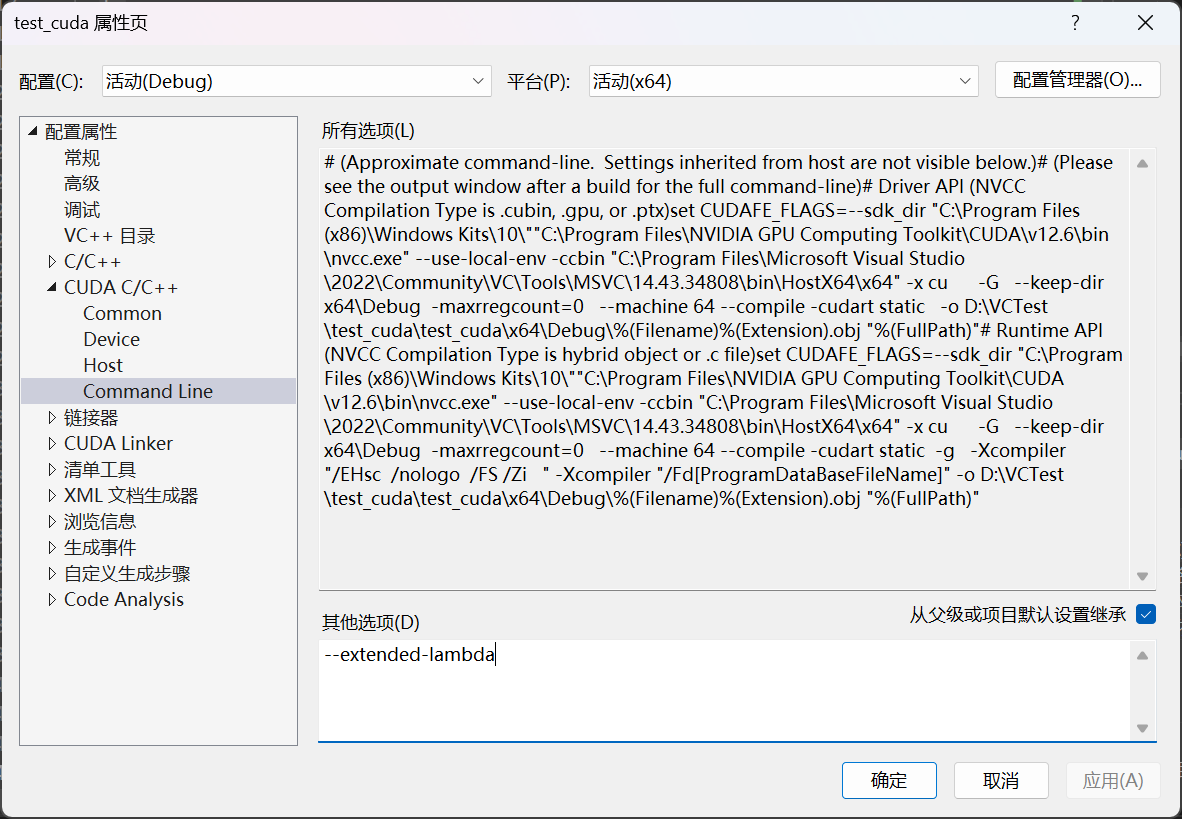CUB 是 NVIDIA 提供的 高性能 CUDA 基礎庫,包含常用的并行原語(Reduction、Scan、Histogram 等),可以極大簡化代碼,并且比手寫版本更優化。
CUB無需鏈接,只用包含<cub/cub.cuh>頭文件即可
需要先臨時獲取空間
CUB 內部需要額外的緩沖區來做并行歸約、掃描等操作,而這個緩沖區的大小依賴于 輸入數據量、算法、GPU 結構,編譯期無法確定。
通用函數接口-Device-level(設備級)
運行在整個設備(grid)范圍,需要全局內存臨時空間。
cub::DeviceReduce::Reduce
template <typename InputIteratorT,typename OutputIteratorT,typename ReductionOp,typename T>
static cudaError_t Reduce(void *d_temp_storage, // 臨時存儲區指針size_t &temp_storage_bytes, // 存儲區大小InputIteratorT d_in, // 輸入迭代器(GPU 內存)OutputIteratorT d_out, // 輸出迭代器(GPU 內存)int num_items, // 輸入元素個數ReductionOp reduction_op, // 歸約操作符(如加法、最大值)T init, // 歸約初始值cudaStream_t stream = 0); // CUDA 流
d_temp_storage和temp_storage_bytes:兩階段調用機制(先獲取大小再分配)d_in/d_out:輸入和輸出數組指針(在 GPU 上)num_items:元素數量reduction_op:歸約操作(例如cub::Sum(),cub::Max(),或自定義 Lambda)init:歸約起始值stream:運行在哪個 CUDA stream 上
求和
#ifndef __CUDACC__
#define __CUDACC__
#endif
#include <cuda_runtime.h>
#include <device_launch_parameters.h>
#include <cublas_v2.h>
#include <cufft.h>
#include<cub/cub.cuh>
#include <iostream>
#include<cstdio>
#include <vector>void error_handling(cudaError_t res) {if (res !=cudaSuccess) {std::cout << "error!" << std::endl;}
}
int main() {const int N = 8;float h_in[N] = { 1, 2, 3, 4, 5, 6, 7, 8 };float* d_in, * d_out;cudaMalloc(&d_in, N * sizeof(float));cudaMalloc(&d_out, sizeof(float));cudaMemcpy(d_in, h_in, N * sizeof(float), cudaMemcpyHostToDevice);void* d_temp_storage = nullptr;size_t temp_storage_bytes = 0;cub::DeviceReduce::Reduce(d_temp_storage,temp_storage_bytes,d_in,d_out,N,cub::Sum(),0.0f);// 分配臨時空間cudaMalloc(&d_temp_storage, temp_storage_bytes);// 第二次調用:執行歸約cub::DeviceReduce::Reduce(d_temp_storage, temp_storage_bytes,d_in, d_out, N,cub::Sum(), 0.0f);float h_out;cudaMemcpy(&h_out, d_out, sizeof(float), cudaMemcpyDeviceToHost);std::cout << "Sum = " << h_out << std::endl;cudaFree(d_in);cudaFree(d_out);cudaFree(d_temp_storage);return 0;
}
當然,Reduce是通用版本,也有Sum的特化版本
template <typename InputIteratorT, typename OutputIteratorT, typename NumItemsT>cudaError_tstatic Sum(void* d_temp_storage,size_t& temp_storage_bytes,InputIteratorT d_in,OutputIteratorT d_out,NumItemsT num_items,cudaStream_t stream = 0);
#ifndef __CUDACC__
#define __CUDACC__
#endif
#include <cuda_runtime.h>
#include <device_launch_parameters.h>
#include <cublas_v2.h>
#include <cufft.h>
#include<cub/cub.cuh>
#include <iostream>
#include<cstdio>
#include <vector>void error_handling(cudaError_t res) {if (res !=cudaSuccess) {std::cout << "error!" << std::endl;}
}
int main() {const int N = 8;float h_in[N] = { 1, 2, 3, 4, 5, 6, 7, 8 };float* d_in, * d_out;cudaMalloc(&d_in, N * sizeof(float));cudaMalloc(&d_out, sizeof(float));cudaMemcpy(d_in, h_in, N * sizeof(float), cudaMemcpyHostToDevice);void* d_temp_storage = nullptr;size_t temp_storage_bytes = 0;// 先獲取臨時空間大小cub::DeviceReduce::Sum(d_temp_storage, temp_storage_bytes, d_in, d_out, N);cudaMalloc(&d_temp_storage, temp_storage_bytes);// 執行 Reducecub::DeviceReduce::Sum(d_temp_storage, temp_storage_bytes, d_in, d_out, N);float h_out;cudaMemcpy(&h_out, d_out, sizeof(float), cudaMemcpyDeviceToHost);std::cout << "Sum = " << h_out << std::endl;cudaFree(d_in);cudaFree(d_out);cudaFree(d_temp_storage);return 0;
}
自定義乘積
可以求數組所有元素的乘積;乘積Reduce沒有提供接口,可以自己寫一個可執行對象(仿函數類,lambda表達式等都可以)
這里使用lambda表達式
#ifndef __CUDACC__
#define __CUDACC__
#endif
#include <cuda_runtime.h>
#include <device_launch_parameters.h>
#include <cublas_v2.h>
#include <cufft.h>
#include<cub/cub.cuh>
#include <iostream>
#include<cstdio>
#include <vector>void error_handling(cudaError_t res) {if (res !=cudaSuccess) {std::cout << "error!" << std::endl;}
}
int main() {const int N = 8;float h_in[N] = { 1, 2, 3, 4, 5, 6, 7, 8 };float* d_in, * d_out;cudaMalloc(&d_in, N * sizeof(float));cudaMalloc(&d_out, sizeof(float));cudaMemcpy(d_in, h_in, N * sizeof(float), cudaMemcpyHostToDevice);void* d_temp_storage = nullptr;size_t temp_storage_bytes = 0;cub::DeviceReduce::Reduce(d_temp_storage, temp_storage_bytes, d_in, d_out, N, []__device__(float a, float b) ->float{ return a * b; }, 1.0f);// 分配臨時空間cudaMalloc(&d_temp_storage, temp_storage_bytes);// 第二次調用:執行乘積cub::DeviceReduce::Reduce(d_temp_storage, temp_storage_bytes, d_in, d_out, N, []__device__(float a, float b) ->float{ return a * b; }, 1.0f);float h_out;cudaMemcpy(&h_out, d_out, sizeof(float), cudaMemcpyDeviceToHost);std::cout << "mul = " << h_out << std::endl;cudaFree(d_in);cudaFree(d_out);cudaFree(d_temp_storage);return 0;
}
如果想要使用在設備使用lambda表達式,需要編譯時加上:
nvcc main.cu -o main --extended-lambda
如果用VS,打開項目屬性,在這里加:

(用仿函數類就不用開啟這個,如此即可)
struct MultiplyOp {__device__ float operator()(float a, float b) const {return a * b;}
};// 調用
cub::DeviceReduce::Reduce(d_temp_storage, temp_storage_bytes,d_in, d_out, N,MultiplyOp(), 1.0f);前綴和
前綴和有專門的函數
template <typename InputIteratorT, typename OutputIteratorT>static cudaError_t ExclusiveSum(void* d_temp_storage,// 臨時存儲指針size_t& temp_storage_bytes,// 臨時存儲大小InputIteratorT d_in,// 輸入迭代器(指針)OutputIteratorT d_out,// 輸出迭代器(指針)int num_items,// 元素數量cudaStream_t stream = 0)// CUDA 流(可選)
;使用起來沒有任何差別
#ifndef __CUDACC__
#define __CUDACC__
#endif
#include <cuda_runtime.h>
#include <device_launch_parameters.h>
#include <cublas_v2.h>
#include <cufft.h>
#include<cub/cub.cuh>
#include <iostream>
#include<cstdio>
#include <vector>void error_handling(cudaError_t res) {if (res !=cudaSuccess) {std::cout << "error!" << std::endl;}
}
int main() {const int N = 8;float h_in[N] = { 1, 2, 3, 4, 5, 6, 7, 8 };float* d_in, * d_out;cudaMalloc(&d_in, N * sizeof(float));cudaMalloc(&d_out, N*sizeof(float));cudaMemcpy(d_in, h_in, N * sizeof(float), cudaMemcpyHostToDevice);void* d_temp_storage = nullptr;size_t temp_storage_bytes = 0;// 獲取臨時空間大小cub::DeviceScan::ExclusiveSum(d_temp_storage, temp_storage_bytes, d_in, d_out, N);cudaMalloc(&d_temp_storage, temp_storage_bytes);// 執行 Exclusive Scancub::DeviceScan::ExclusiveSum(d_temp_storage, temp_storage_bytes, d_in, d_out, N);float h_out[N];cudaMemcpy(h_out, d_out, N * sizeof(float), cudaMemcpyDeviceToHost);std::cout << "Exclusive Scan: ";for (int i = 0; i < N; i++) std::cout << h_out[i] << " ";std::cout << std::endl;cudaFree(d_in);cudaFree(d_out);cudaFree(d_temp_storage);return 0;
}
ExclusiveScan 是前綴和,不包括當前元素:
輸入: [1, 2, 3, 4, 5, 6, 7, 8]
輸出: [0, 1, 3, 6,10,15,21,28]
Block-level (線程塊級)
作用
用于一個 Block 內的線程協作,通常替代手寫的
__shared__+ 手寫 reduce/scan。比 Warp-level 更大范圍(整個 block),但不涉及 grid 級同步。
用途:塊內歸約、塊內前綴和、塊內排序。
線程塊級類的調用套路是一樣的
定義類型(
typedef)申請共享內存(
TempStorage)調用對象的方法
BlockReduce模板類
namespace cub {template <typename T, // 數據類型,例如 float, intint BLOCK_DIM_X, // 線程塊大小cub::BlockReduceAlgorithm ALGORITHM = cub::BLOCK_REDUCE_WARP_REDUCTIONS // 可選//還有一些其他模板參數,一般都可以忽略
>
class BlockReduce {
public:// 內部類型:臨時存儲struct TempStorage;// 構造函數:傳入共享內存__device__ __forceinline__ BlockReduce(TempStorage& temp_storage);// 常用方法:__device__ T Sum(T input); // 塊內所有線程求和template <typename ReductionOp>__device__ T Reduce(T input, ReductionOp reduction_op); // 自定義規約操作__device__ T Sum(T input, T identity); // 帶初始值的求和// 返回最大值和索引struct ArgMax { T value; int index; };__device__ ArgMax Reduce(T input, ReductionOp reduction_op, ArgMax identity);
};} // namespace cub特點
不需要手寫循環/
__syncthreads(),CUB 自動優化 bank conflict。自定義操作用
.Reduce(val, binary_op)。
塊內歸約
__global__ void block_reduce_sum(float* d_in, float* d_out) {// 定義 BlockReduce 類型:數據類型 float,block 大小 256typedef cub::BlockReduce<float, 256> BlockReduceT;// 共享內存(臨時存儲)__shared__ typename BlockReduceT::TempStorage temp_storage;int tid = threadIdx.x + blockIdx.x * blockDim.x;float val = d_in[tid];// 每個 block 歸約,返回該 block 的總和float block_sum = BlockReduceT(temp_storage).Sum(val);if (threadIdx.x == 0) {d_out[blockIdx.x] = block_sum; // 每個 block 的結果}
}BlockReduce::Sum(T input) 里的 input 參數 是 當前線程貢獻的單個值,也就是參與規約的元素。
BlockReduce::Sum() 會在整個 線程塊(block)內,把所有線程的 input 值加起來,返回 塊內的總和。
自定義規約
__device__ T Reduce(T input, ReductionOp reduction_op); // 自定義規約操作該成員函數可以讓我們實現自定義的規約操作
| 參數 | 含義 |
|---|---|
input | 每個線程的本地值,類型為 T。 |
binary_op | 一個二元操作函數對象,類型為 BinaryOp,定義了如何將兩個 T 類型的值合并。例如:加法、乘法、最大值等。 |
比如可以用cub庫提供的可調用對象類
float block_sum = BlockReduceT(temp_storage).Reduce(val, cub::Sum());//規約加法
float block_prod = BlockReduceT(temp_storage).Reduce(val, cub::Multiply());//規約乘法也可以自己實現仿函數類或lambda表達式;具體操作與上文Device級別的自定義乘積類似;
BlockScan
namespace cub {template <typename T, // 數據類型int BLOCK_DIM_X, // 線程塊大小cub::BlockScanAlgorithm ALGORITHM = cub::BLOCK_SCAN_WARP_SCANS // 可選
>
class BlockScan {
public:struct TempStorage;__device__ __forceinline__ BlockScan(TempStorage& temp_storage);// 前綴和(不包含自己)template <typename ScanOp>__device__ void ExclusiveScan(T input, T &output, ScanOp scan_op, T identity);// 前綴和(包含自己)template <typename ScanOp>__device__ void InclusiveScan(T input, T &output, ScanOp scan_op);// 常用簡化版本__device__ void ExclusiveSum(T input, T &output, T identity = 0);__device__ void InclusiveSum(T input, T &output);
};} // namespace cub
使用
typedef cub::BlockScan<int, 256> BlockScanT;
__shared__ typename BlockScanT::TempStorage temp_storage;
int output;
BlockScanT(temp_storage).ExclusiveSum(input, output);
BlockRadixSort
namespace cub {template <typename KeyT, // 鍵類型int BLOCK_DIM_X, // 線程塊大小typename ValueT = void, // 可選,值類型int ITEMS_PER_THREAD = 1 // 每線程處理的元素個數
>
class BlockRadixSort {
public:struct TempStorage;__device__ __forceinline__ BlockRadixSort(TempStorage& temp_storage);// 對鍵排序(升序),排序后把屬于該線程的key更新__device__ void Sort(KeyT &key);// 降序__device__ void SortDescending(KeyT &key);// 鍵值對排序__device__ void Sort(KeyT &key, ValueT &value);__device__ void SortDescending(KeyT &key, ValueT &value);
};} // namespace cub
使用模式
#include <cub/cub.cuh>__global__ void block_sort(int *d_keys) {typedef cub::BlockRadixSort<int, 256> BlockRadixSortT;__shared__ typename BlockRadixSortT::TempStorage temp_storage;int thread_id = threadIdx.x + blockIdx.x * blockDim.x;int key = d_keys[thread_id];// 在 block 內排序(升序)BlockRadixSortT(temp_storage).Sort(key);// 寫回排序后的值d_keys[thread_id] = key;
}
Warp-level
Warp-level 原語(線程束級)
用于warp 內高效協作,替代手寫
__shfl_*。適合 warp 內歸約(reduce)、前綴和(scan),比手寫更可讀。
具體用法與block級一模一樣,只是模板類名改為WarpReduce、WarpScan

)
)

ARM體系架構)







)






-Java并發篇)